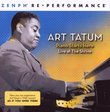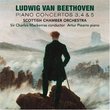| All Artists: Wolfgang Amadeus Mozart, Johann Christian Bach, Paul Freeman, Janos Ferencsik, Kurt Masur, Musica Amphion, Pieter-Jan Belder, Philharmonia Orchestra of London, Hungarian State Symphony Orchestra, Dresden Philharmonic Orchestra, Derek Han, Zoltán Kocsis, Dezso Ranki, András Schiff, Annerose Schmidt Title: Mozart: Piano Concertos [Box Set] [Hybrid SACD] Members Wishing: 1 Total Copies: 0 Label: Brilliant Classics Original Release Date: 1/1/2005 Re-Release Date: 9/27/2005 Album Type: Box set, Hybrid SACD - DSD, Import Genre: Classical Styles: Chamber Music, Forms & Genres, Concertos, Sonatas, Historical Periods, Classical (c.1770-1830), Instruments, Keyboard Number of Discs: 11 SwapaCD Credits: 11 UPC: 675754854829 |
Search - Wolfgang Amadeus Mozart, Johann Christian Bach, Paul Freeman :: Mozart: Piano Concertos [Box Set] [Hybrid SACD]
![Mozart: Piano Concertos [Box Set] [Hybrid SACD]](https://nationalbookswap.com/cd//l/56/9056/6129056.jpg) | Wolfgang Amadeus Mozart, Johann Christian Bach, Paul Freeman Mozart: Piano Concertos [Box Set] [Hybrid SACD] Genre: Classical
|
Larger Image |
CD DetailsSimilar CDs |
CD ReviewsComp P Ctos: multi-channel Super Audio, Wonderful Mozart Dan Fee | Berkeley, CA USA | 03/17/2006 (5 out of 5 stars) "My ears tell me positive things about this set, as super audio sound in multiple channels, and as Mozart performance by both pianist and orchestra. Here is what I hear:Disc 1 is very early Mozart, with keyboard concertos (K. 107) played on the harpsichord by Pieter-Jan Belden. He eventually won the 2000 Leipzig Bach prize for his harpsichord playing, and this shows in his approach to early Mozart. Musica Amphion accompanies well on period instruments. The musicians nicely capture the Rococo melding of French baroque and other influences, captured by the human ear as things were in the very process of morphing the Baroque harpsichord with strings into something even better. Rounding out disc one is a set of four keyboard sonatas by JC Bach, himself another transitional figure, opening toward the era we would later recognize as the Classical Era. These JC Bach sonatas are good companions for the early K. 107 concertos, given how indebted these works are to what was then called the Galante Style; and Belden plays them as well as he does the early Mozart. By way of Italy, JC Bach eventually ended up in London where he was promoted within two years of arriving to be master of the Queen's music; keeping house with composer Karl Abel until his death. JC was the eleventh son of JS Bach, and nobody these days would be surprised to find out that he and Karl were more than composer buds, and perhaps life companions. These early works have great charm, but hardly suggest what the composer would later do with the accompanied keyboard music genre. The super audio sound is fine without in any way serving to upstage the music. Pretend you are spending a week in the country with a family whose pedigree is impeccable; yet the younger son has branched out into the British Empire's mercantile wealth with, say, the East India Company. Disc two contains K. 491 (No. 24), plus the very early K. 40 (no. 3), plus the middle-ish K. 415 (no. 13). The early K. 40 is actually the young Mozart arranging other composers for his own virtuoso child prodigy displays. The K. 415 concerto is the first of the Vienna concertos, so Mozart has left his father, as well as Salzburg, and is looking forward to coming into his own. The concert that showcased K. 40 earned Mozart a handsome sum, and his bright future dawning newly in Vienna must have seemed worth all the drama of setting out on his own. K. 491 is a later work, and we can hear the great Mozart of whom we instantly think, from about the same period as when he was writing his opera, The Marriage of Figaro. Disc three contains K. 450 / no. 15, K. 413 / no. 11, and another later masterpiece, K. 488 / no. 23. The eleventh and fifteenth concertos are mature Mozart, while the late one is by all accounts, transcendant. Disc four contains two late concertos, K. 467 / no. 21, K. 503 / no. 25, plus an early K. 37 / no. 1. Disc five contains K. 271/ no. 9, along with K. 414 / no. 12, and another early K. 39 / no. 2. Disc six holds K. 453 / no. 17, along with K. 238 / no. 6, and K. 175 / no. 5 which latter two round out the first set of Vienna piano concertos, written to herald Mozart's arrival in the acknowledged music capital of Europe. Disc seven continues with K. 451 / no. 16, K. 459 / no. 19, and K. 246 / no. 8 (the Lutzow, from the year 1776). Disc eight hold two late masterpieces, K. 466 / no. 20, and K. 482 / no. 22, respectively. Disc nine offers K. 456 / no. 18, along with K. 527 / no. 26, the Coronation Concerto - included in the festivities to celebrate the new emperor, Leopold II. Disc ten completes the solo keyboard concertos with K. 449 / No. 14, K. 595 / no. 27, and the very early K. 41 / no. 4. Disc eleven is a bonus which includes the two- and three-piano concertos, including the likes of Deso Ranki, Zoltan Kocsis, and Andras Schiff, accompanied by the Hungarian State Orchestra with Janos Ferencsik conduting. The main pianist is American prodigy Derek Han. He performs K. 37, through K. 595. He is partnered by the renowned Philharmonia Orchestra of London, conducted by Paul Freeman. As these details suggest, the Mozart concertos are in very good hands in this set. Derek Han had his debut as a ten-year-old boy in Ohio, followed by getting his undergrad music degree from Juilliard in New York City, at eighteen. At Juilliard, he was a scholarship student of Ilona Kabos. Then he went to Italy where he eventually earned an Honors Diploma from the Academia Musicale Chigiana in Siena. Along the way, he appears to have taken master classes from teachers like Gina Bachauer and Lili Kraus. The name of beloved Hungarian pianist Lili Kraus is the big clue to Han's wonderful way with Mozart. Her complete recorded set of the Mozart piano concertos was revelatory, as was her recorded set of the complete piano sonatas. Her orchestra was basically a so-so pickup band of freelance players in Vienna; while Han benefits from the Philharmonia under Paul Freeman's notable leadership. Thus, Derek Han offers us Mozart in highly musical playing: with crystalline clarity, fleetly sophisticated refinement of touch, and flashes of drama, leavened with musical wit. This amounts to saying that he aims to offer us the whole Mozart, and succeeds in doing so, so far as the piano concertos are concerned. I don't know how long he studied with Lili Kraus, but judging from this set, he has received the golden and glittering seal of her special genius for Mozart from her own hands and heart and mind. Nothing is Beethoven here, all is Mozart. The orchestra distinguishes itself with brilliant work in all departments, pointing up Mozart's particular genius in the woodwind writing, especially in the later concertos. Paul Freeman commands the helm, utterly invisible yet deeply musical - which in Mozart performance amounts to high praise, indeed. Now, thankfully, there are other very good complete sets of the piano concertos. Brendel and Marriner. Murray Perahia. Schiff and the Mozarteum. Uchida and Tate. Buchbinder and the Vienna Symphony. Happily, Derek Han and Freeman with the Philharmonia can be welcomed without hesitation into this good company. The super audio sound is multichannel, and in the best sense of my earlier word, invisible. All you get in this set in Mozart. Pretend you are having a private concert, say, in the larger room of your summer palace outside Vienna. You have enough money to have hired the best available players to travel in, from the big city. Well, it is even better than that. Musicians these days are technically miles ahead of their forebears, overall. Innumerable starts for performance, ten stars for super audio multichannel sound." THE ONLY BOX of Mozart Piano Concertos you'll need Ears that can actually hear | Seattle, WA | 08/05/2008 (5 out of 5 stars) "I hesitated to buy this box since there were only two reviews--one was 5 stars and said it was music from heaven and the other wouldn't recommend it to their worst enemy. I'm here to tell I'm that I'm 58 years old and have been a classical music and jazz collector since I was 14 years old. Mozart is one of my favorite composers and the Piano Concertos are among my very favoirite work. I also have a high end hi fi system which has about $250,000.00 invested in it along with a state of the art two channel sacd/cd player that upsamples everything to 24/192kz The music collected in this incredibly reasonably priced box rivals the best performances I have in my record collection as well as pre-recorded open reels played on a Revox pro machine . The sonics are second to none. My jaw dropped to the floor on hearing Mozart's 17th Piano Concerto--my favorite of the bunch and of which I own 7 different copies. The performance was very similar to and every bit as good as the one Geza Anda did for DGG--open reel-(forget the DGG record which was ruined by 'equalzation' for inferior U.S. turntables. All of the works I've listened to so far of of similar quality, both performance and sonic-wise. The SACD playback is so incredibly good that I'm going to sell all my other copies of these performances Even the 15 ips half track dubbed from a master recording by Decca.. My wive will be pleased that I'll have reduced my entire collection of the Mozart Concertos to one small little package containing 11 cds. For $40.00 with free shipping no less! Highest recommendation!" DECEPTION Chilean Opera lover | Santiago, Chile | 12/28/2007 (2 out of 5 stars) "These concerts are played in a mediocre way and worse, most of them are recorded in 1992 and remastered to SACD. All of them are remastered in Brazil and the results is really bad. THIS IS NOT SOUND FOR SACD at most for a common CD. The surround sound is not natural as expected."
|

 Track Listings (14) - Disc #1
Track Listings (14) - Disc #1![Respighi: Pines of Rome; Fountains of Rome; Debussy: La mer [Hybrid SACD]](https://nationalbookswap.com/cd//m/26/3726/6133726.jpg)
![Rimsky-Korsakov: Scheherazade; Stravinsky: Song of the Nightingale [Hybrid SACD]](https://nationalbookswap.com/cd//m/81/2881/6122881.jpg)


![Offenbach: Gaïte parisienne; Rossini-Respighi: La boutique fantasque [Hybrid SACD]](https://nationalbookswap.com/cd//m/94/2894/6122894.jpg)